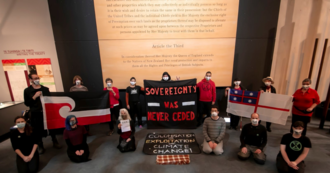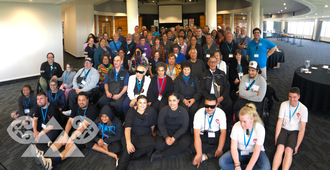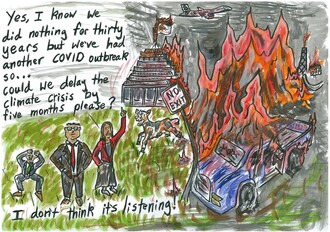-
Te Papa: Tell the Truth about Te Tiriti o WaitangiSince the 1998 opening of the Museum of New Zealand/Te Papa Tongarewa, it has never honestly been 'Our Place'. The permanent exhibit ‘The Treaty of Waitangi: Signs of a Nation’ has been untruthful and a continuing act of colonialism since Te Papa’s doors first swung open. Even with the well-spring of experts and experience brought in to guide them, it appears that the Te Tiriti o Waitangi exhibition was always intended to deceive by misrepresenting NZ history to all its visitors. The English ‘Treaty’ displayed prominently and equally across from Te Tiriti o Waitangi (in Te Reo Māori) implies the two documents hold equal status and legitimacy. This is a lie, as Te Tiriti is the only internationally-recognised document with legal authority. The current design of the exhibit also implies that the displayed Treaty (in English) is a true translation of Te Tiriti, which is another lie, as there are significant material differences between the two texts. These differences need to made obvious, rather than being in the ‘fine print’ which many won’t read. Te Waka Hourua, with support from members of Extinction Rebellion Aotearoa New Zealand, have written to Te Papa’s Board, calling for removal of the English artefact from its place of prominence alongside Te Tiriti o Waitangi, and also staged a protest at the exhibit in solidarity with Māori resisting ongoing colonial oppression. Although Te Papa has acknowledged our grievances, they have not taken any action. This is of additional concern as it will be mandatory for schools to teach Aotearoa New Zealand history from 2023, making the obligation on New Zealand’s ‘national museum’ to correct its misinformation even more urgent. Te Papa shouldn’t wait, and must act as soon as possible: our nation has already endured 181 years of deceit founded on inaccurate historical accounts (in addition to pre-Tiriti colonial history). References: https://www.stuff.co.nz/environment/climate-news/126779415/climate-protests-kick-off-as-council-issues-disruption-warning-for-wellington. https://www.education.govt.nz/our-work/changes-in-education/aotearoa-new-zealand-histories-in-our-national-curriculum/. What will happen after the petition closing date of 6 February 2022? Te Waka Hourua will provide an update on the petition result via live webinar (preferably on Waitangi Day 6 February 2022, but details to be confirmed closer to petition closing date), and invite open discussion about next steps. Groups in support of this petition: - Network Waitangi Whangārei - Peace Movement Aotearoa - STIR (Stop Institutional Racism) - Climate Justice Taranaki909 of 1,000 SignaturesCreated by Te Waka Hourua
-
Call to action on housing in KāpitiThe 240 houses that Kāinga Ora has across the District are not enough to house long-term homeless people, let alone the growing number of people who are coming onto the list. This includes people who formerly rented in the private sector and who have been given notice to leave their homes as landlords have decide to sell their properties. Even if there was an adequate supply of private sector accommodation, the exorbitant rents mean that people simply can't afford to meet that cost. There is strong support for this call for action across the entire Kāpiti population. Young people who can't afford to leave home; families with children who move in with their parents because they can't afford the rent demanded; an 85-year-old who has lived in the same unit for 17 years being given notice because the landlord is going to rent to a family member; working single people who can't afford a one bedroom flat - the scenarios come thick and fast and we hear them all.422 of 500 SignaturesCreated by Donna Bridgeman
-
OPEN LETTER: Stop sending our plastic waste to developing countriesNew Zealand has exported over 98,000 tonnes (and counting) of plastic waste offshore since the beginning of 2018. More than 46,000 tonnes of this has been shipped to Malaysia and Thailand. In the case of Malaysia, the plastics are imported from New Zealand and illegally burned next to schools and homes, causing a health and environmental epidemic. Cancer and asthma cases have increased. Microplastics leach into the waterways. The air is polluted with burnt plastic and ecosystems have been destroyed. The Ministry for the Environment has just published a consultation document on New Zealand's waste management strategy, "Te kawe i te haepapa para - Taking responsibility for our waste". Disappointingly, the consultation document does not “take responsibility” because it completely ignores the fact that our plastic waste exports are not being recycled by the receiving countries and the repercussions of this. The plastic waste is able to be exported because of a major loophole in the law: our kerbside recyclables and industrial plastics are not sufficiently regulated under the Imports and Exports (Restrictions) Prohibition Order (No 2) 2004 because they are considered “easily recyclable”. Section 11 of the Order requires a permit to be issued by the Environmental Protection Authority for hazardous plastics. Polyethylene (PE), polypropylene (PP), and polyethylene terephthalate (PET) recyclables are exempt from this law (under Part 2A of Schedule 3) and therefore are assumed to be “disposed of or managed in an environmentally sound and efficient manner in the importing State." Just because something is deemed to be “easily recyclable” does not mean that it is guaranteed to be recycled at the receiving country. We therefore call on the New Zealand government to immediately ban all plastic waste exports by December 2022 which is the last month that Parliament will sit in that year. New Zealand authorities still operate under the assumption that, as long as our plastic exports are easily recyclable, shipping them overseas is a satisfactory solution to our waste problem. In reality, New Zealand is shipping its emissions to developing countries. Some may say that the issue lies with Malaysian authorities not enforcing its own laws to stop the open burning of plastic waste. We reject this argument. The issue lies with New Zealand turning a blind eye to the reality on the ground. We are just as culpable when we knowingly export our waste to countries with poor resources, capacity and capability for effective monitoring, reporting, compliance, and enforcement and weak environmental and human rights protections. This is also a human rights issue and our moral obligation to Malaysia (and other developing countries) and its people should be paramount. We want the New Zealand government to invest urgently in systems and infrastructure that will reduce our reliance on plastic. It is not enough to tweak our regulations on the way our waste is exported, as the bigger problem lies with our overconsumption, poor import restrictions on toxic and single use plastics, and resins that cannot be recycled domestically. New Zealand is drowning in plastic and we cannot manage that amount responsibly, here or offshore. We need to turn off the tap and the government must establish policies and invest in systems and infrastructure that empower people to dramatically reduce their plastics consumption . We must reduce the range of plastics we import into New Zealand to those deemed non-hazardous by the Basel Convention: PE, PP and PET type plastics. We want the government to invest in companies that enable consumers to refill and reuse, rather than investing in a plastic innovation fund that will only preserve our plastic addiction (bioplastics, for example, are not necessarily good for the environment). We need the government to make plastic-producing companies responsible for their product’s lifecycle. New Zealand is embarrassingly behind other OECD countries in requiring companies to implement product stewardship schemes to address the problem at the source. We strongly urge the government to establish import controls and product stewardship laws. Use the regulatory tools we already have to streamline the type and amount of plastics that we do use to fit with our onshore recycling capacity. We also demand greater transparency and accountability from recycling and waste management companies to ensure that all post-consumer plastics are safely and domestically managed without any leakage to the environment. Even so, none of these measures will amount to much if we continue to send our waste overseas to vulnerable countries. We call on the Prime Minister to ensure that the waste management strategy is as transformative as its title suggests - that we are "taking responsibility for our waste" and not polluting other countries. To do this, we must immediately ban the export of plastic waste while transitioning to a safer circular economy in which plastics are minimalised. The government has boldly banned single-use plastic bags and microbeads, so it is no stranger to making bold decisions for the greater environmental and social good. Signed, Lydia Chai Pua Lay Peng Niamh Peren (Founder of Tino Pai Aotearoa / Thumbs Up New Zealand) Dr Trisia Farrelly (Political Ecology Research Centre, Massey University) Liam Prince (Aotearoa Plastic Pollution Alliance) Manawatū Food Action Network The ReCreators Sustainable Strategy Ltd Resilient Russell Charitable Trust Nonstop Solutions Carbon Neutral Waiheke Vision Kerikeri Federation of Women's Health Councils Aotearoa NZ Nuclear Free Peacemakers Network Waitangi Otautahi Inc 350 Otautahi Christchurch [Full list of organisations here: https://docs.google.com/document/d/18CppQ1cB2f3bV63xQxj6TWMK9bcLDq7Triwgb-EVpaw/edit?usp=drivesdk]11,824 of 15,000 SignaturesCreated by Lydia Chai

-
RNZFB: Honour Te Tiriti o Waitangi in your decision makingKāpō Māori Aotearoa members and whānau have lost confidence in the Royal New Zealand Foundation of the Blind (RNZFB) Incorporated governance practices and decision-making processes. - Kāpō Māori, kāpō youth and parents’ do not have a seat at the governance table. - Tāngata kāpō and parent consumer leadership funding continues to shrink. - "We know what’s best” governance approach that incites controversy and distrust of RNZFB governors and employees. - Reactive governance actions that polarise the kāpō sector. - Apathy and disregard to affirm through governance action the articles of Te Tiriti o Waitangi. Our rangatiratanga is being marginalised and will continue to be if we do not take urgent action to fix what is obviously broken! This petition is the first step towards affirmative change. Show your support by signing our petition.141 of 200 SignaturesCreated by Chrissie Cowan

-
Emergency MIQ entry for pregnant couples to birth safely in New ZealandPregnant women and their unborn children are being put at risk because MIQ emergency allocation request guidelines do not address pregnancy needs. Very few get access to return to NZ. It has been reported that of 229 applications for pregnancy only 23 were approved.(1) We believe it is essential that pregnant people and their partners can return to NZ for antenatal, birth, and postpartum care, and that their health requirements be recognised as critical. Approaching birthing solo without the support of whānau, especially the other parent, is extremely stressful for pregnant people. Having to wait until you are heavily pregnant to return to New Zealand creates an added risk to both mother and baby. There are a number of cases where we’ve managed to get access to MIQ for pregnant people or their partners but it should not be left to individual advocacy. The New Zealand government must recognise and support the rights of pregnant people and ensure they can safely return home to birth their children. You can read more about this issue in the links below: https://www.stuff.co.nz/national/health/coronavirus/126612589/pregnancy-should-be-a-miq-priority-because-stress-endangers-the-baby-sir-peter-gluckman-says https://www.rnz.co.nz/national/programmes/first-up/audio/2018816139/father-of-prem-baby-applies-for-emergency-miq https://www.stuff.co.nz/national/health/coronavirus/127001444/miqsplit-couple-reunited-but-too-late-for-babys-sudden-and-traumatic-birth Reference: 1. https://i.stuff.co.nz/national/health/coronavirus/126598255/how-will-i-manage-pregnant-womans-fears-after-husbands-miq-denial134 of 200 SignaturesCreated by Roshni Sami
-
Tax the use of virgin plastics in manufacturing and importsPlastic is a highly recyclable material. However, the vast majority (around 90%) ends up in landfills. And that's because recycling costs money, and in the end, virgin plastics end up being cheaper. If we want to make a difference in this pollution epidemic, we need to work it at the source... Money. Plastic pollution has become a massive issue for New Zealand and the planet. But the issue lies in the economics of recycling it: it's simply not profitable. By shifting the tides, even just a little bit, towards the use of recycled plastics, we can drive local entities towards making greater efforts to fight this war on pollution. We can also ensure that there is large, bold labelling of plastic types so consumers are able to sort their recyclables with greater ease and accuracy. It's important because we're currently using little plastic bags that last for 200 years as single use packagings for things like instant rice. The problem of plastic recycling and its longevity have been on peoples minds since around the 50s until the oil industry convinced the general public that it'd all be recycled. In 2016, next to all of the plastic recycling stopped because China stopped taking it, so now we've got to come up with long-term strategies to avoid massive plastic pollution, and all the health and ecological repercussions that come with that. Not only would taxing virgin plastic imports and production change the economics of recycling, it also addresses a party that has been getting away with poisoning New Zealand's land, waters, and people for over 50 years. Perhaps they deserve a very high tax, but that's up to the policymakers. For more information visit: https://sciencenorway.no/.../why-is-so-little.../1457439 https://www.npr.org/.../how-big-oil-misled-the-public... https://www.ft.com/.../360e2524-d71a-11e8-a854-33d6f82e62f8 YouTube.com/watch?v=KXRtNwUju5g78 of 100 SignaturesCreated by Gordon Miles
-
End library book fines in ŌtautahiThere is "...no evidence that library overdue charges are an incentive for returning items on time. The experience of libraries in New Zealand and overseas is that overdue charges are a more effective deterrent and barrier to library usage, disproportionately impacting members of the community on lower and fixed incomes." (1). This change is important as it will bring Ōtautahi up to par with its peers across Aotearoa including Auckland, Carterton, Clutha, Dunedin, Masterton, Nelson, Selwyn, South Taranaki, South Wairarapa, Stratford, Upper Hutt, Waikato and Waimakariri that have, and or are removing these fines because evidence does not support that they work, and that they create barriers to access and learning. We have also seen post lockdown when the Council encouraged people to return books with a fee waiver we did, lets now make that permanent (2). (1). Report to Dunedin City Council from 27 October 2021 when they decided in favour- https://infocouncil.dunedin.govt.nz/Open/2021/10/CNL_20211027_AGN_1542_AT.PDF (2). https://newsline.ccc.govt.nz/news/story/libraries-issue-call-to-return-overdue-books295 of 300 SignaturesCreated by Josiah Tualamali'i
-
Support survivors abused in careWe all need to support survivors, provide them the justice they deserve and support setting up an entity with the appropriate authority to address New Zealand’s continuing abuse in care crisis. In 2018 after huge public pressure, the Labour-led Government launched a Royal Commission of Inquiry into Abuse in care. Over three years the Inquiry heard evidence of abuse of children and vulnerable adults in care. As many as a quarter-million tamariki are likely to have been abused over decades. The evidence showed institutions chose the protection of their reputation and financial assets over help for the victims of abuse in their care, and have created barriers to discourage survivors reporting abuse. The Government is currently considering the Inquiry's recommendations for providing redress to survivors. However, survivors are not confident they will include the state entity they are asking for or be inclusive of all survivors abused in the care of an institution. It would be a mistake for the Government to set up a body that is not inclusive and separates State abuse from that of other institutions, such as churches or sports clubs. The Government is ultimately responsible for ensuring children and vulnerable adults in care are protected from harm, no matter which institution cared for them. It is also its responsibility to ensure all survivors of abuse in care be provided with sufficient and appropriate redress. Cabinet Ministers are right now considering bids for funding for the Budget 2022. We need to let them know they need to provide for survivors. The millions spent on the inquiry need to result in action. Many of the survivors are ageing, in their 60's, 70's and 80's, and dealing with the physical and mental consequences of their experiences in state care. The impacts from the abuse are significant and lifelong. They cannot wait more years for future offers of support. Justice for survivors will mean redress and the financial compensation, acknowledgement, apology, and the information they deserve and need. It will also include commitment to the scale of change required to ensure what happened to them does not happen to others. Survivors need an independent entity to report to so that they no longer have to engage in the re-traumatising process of reporting to the institution that they could not trust to keep them safe. They are also asking it have the authority to hold institutions that care for children accountable to ensure the abuse they suffered does not happen to others. An independent ‘Entity’ would have the statutory authority to audit and have oversight of the policies and procedures in place in institutions to protect children and vulnerable adults from harm, investigate and hold institutions accountable where they fail, and provide a public audit report to Government with recommendations for further change when required. The government leaving institutions to deal with the abuse of children in their care has failed. Current systems that exist are not fit for purpose and failing to provide what is needed. They are not accessible to all survivors, and are re-traumatising. We need an ‘Entity’ based on the principles of: • Inclusion • Te Tiriti O Waitangi • Accessibility • Impartiality • Transparency • Consistency • Timely access to Redress • Human Rights and Natural Justice The public remains unaware of the significant abuse crisis New Zealand is facing. Survivors are left unacknowledged, struggling, and silenced. Many have no access to redress systems and the barriers to access them are daunting. They need your support.102 of 200 SignaturesCreated by Network of survivors of abuse in faith based institutions
-
Urgently stop National Library from sending thousands of books to the PhilippinesThis petition was closed Nov 1st and presented to the House of Representatives Nov 22 More info on the Parliament-site https://www.parliament.nz/en/pb/petitions/document/PET_116636/petition-of-sandra-bianciardi-urgently-stop-national-library Because the parliamentary submission (presented on January 20th) appears to have stalled, we have decided to take the unusual step of publishing our submission. You may download the submission here: http://alpha.books.online.fr/Submission-20-1-2023.pdf December 2021, Rachel Esson announced the suspension of disposals, and we learned later on in February through the Dominion and Stuff that "consultations" were to happen with the "stakeholders". But in reality nothing has happened over the last 6 months: eventually in July this year, Rachel Esson, clearly confirmed to an OIA inquiry that the agreement with Internet Archive has NOT been cancelled or modified. https://fyi.org.nz/request/19611-internet-archive-agreement-and-update-of-the-list-of-books-to-be-sent-to-the-philippines#incoming-74684 The list of 428,232 books destined to be digitised in the Philippines and leave New Zealand forever, is the same list as it was before Christmas 2021. Nothing allows us to believe that a discussion will openly take place, on the contrary, the National Library's declaration indicates it is going in exactly the opposite direction. Let’s read once more what R. Esson expressed in Stuff: “People care so passionately. But the world’s moved on, and we don’t need to keep these [books],” she says. “It’s not good for New Zealand, and for us, to keep them. And they’re not being used. And they’re available elsewhere. All those arguments. We’ll find a way through, but I’m not sure that we can please everyone.” (Stuff, https://www.stuff.co.nz/entertainment/books/127618485/help-us-the-national-librarys-unsolvable-dilemma) Therefore, this petition is still as relevant as it was in its first days when it was launched by writers gathering at St Peter's Willis St, in DomStuff Nov 11, 2021. The voices heard at the event were very clear : https://www.stuff.co.nz/national/126965961/authors-gather-for-literary-protest-against-national-librarys-internet-archive-deal or check out Karyn Hay’s LATELY for a live cross just after the event https://www.rnz.co.nz/national/programmes/lately/audio/2018820187/authors-protest-national-library-book-disposal-in-wellington Here’s what you can do: Have a look and share your ideas on the facebook page "Writers Against National Library Disposals" https://www.facebook.com/groups/nodisposals Take a look at the list. Just scroll down to (or seek using Find) "Download the list of books": https://natlib.govt.nz/about-us/strategy-and-policy/collections-policy/overseas-published-collection-management the very identity and function of a National Library is called into question by its donation of the books to an overseas organisation, with no hope of ever recovering them. Therefore this petition not only asks for the Internet-Archive agreement to be cancelled, but also for public consultation about the future of the National Library of New Zealand, a library where professional librarians will be able to fill the collection with any books of the world they judge pertinent to New Zealand researchers and the public. "Who is Responsible" https://nodisposals.neocities.org/html/Who-Is-Responsible.html https://nodisposals.neocities.org/html/Situation-end-2021.html What has happened: Two years ago the National Library announced a plan to rid itself of most of its Overseas Published Collection. These books are national assets and should be treated this way. They contain a wealth of knowledge we do not want to lose. They will be costly to replace, and some will not be able to be replaced. Researchers, writers and students use this collection regularly. ▪︎ Over 600 000 books were initially slated for "secure destruction " by the National Library. ▪︎ The National Library's own statistics show these books are used about as much as any other part of the National Library's collection. ▪︎ 57 000 of the books were sent to a massive book sale at Trentham earlier this year. Approximately 10 000 sold. ▪︎ The National Library has entered into a contract to gift 428 000 books to an American company, Internet Archive, in return for digitising the books. The books will never come back again ▪︎ Internet Archive is facing a major lawsuit alleging breach of copyright in the USA and is opposed by writers and publishers groups nationally and internationally The National Library's rationale for getting rid of the books has shifted over time. ▪︎ It started as a cost saving exercise so it did not have to pay for storing them. "Secure destruction " was its original plan. Publishers figures for 2019 showed 2662 books were published in New Zealand. It would take 150 years to fill the space left by getting rid of the Overseas Published Collection. Extract from Scoop. 29 Oct "All the hard work of thoughtful librarians, their acquisitions and curation over the past century (and more), will be undone. The National Library is descended from the General Assembly Library, founded in 1862. (...) The books are part of our tradition. They are special items, not worthless, ageing assets – and their value is increasing with time. All attempts to persuade our politicians (...) have failed until now. These politicians, through the library’s directors, are effectively ‘legislating’ (in the philosophical sense) against our books. Public outcry is now our recourse." William Direen https://wellington.scoop.co.nz/?p=140249&fbclid=IwAR1tsZqoZ9uxsOyUS_acm17hmVrSgCJYMkcHqEUIDyMpiB263ZVJh5nNVRE We ask that ▪︎The contract with Internet Archive be cancelled Parliament must ensure that the National Library carries out its job in a careful, prudent way as envisaged by those who drafted the legislation it currently operates under.1,024 of 2,000 SignaturesCreated by Sandra Bianciardi
-
Rangatira ai te Whare PāremataRangatira ai te whare pāremata is a social action campaign created by six young rangatahi from Wainuiomata High School. This rōpū was created upon the urge to push for policy change. Our aim is to influence the Sports, Arts, and Culture policy to redistribute the funds fairly. We have chosen to advocate for this kaupapa because we are concerned about the distribution of the government's money and its priorities. One example of this is how the government has excessive vast amounts of money for foreign events (like America’s cup) instead of indigenous ones (like Te Matatini and Matariki). The America’s cup, a rich man's sport, received $149M, whereas Te Matatini which is Māori performing arts only received $1.9M. We believe the New Zealand Government need to re-evaluate their priorities when it comes to funding indigenous needs over international events. With this petition we hope to bring attention to the community matters that our people suffer from on a day-to-day basis. We want to accommodate our people as this affair does not just concern us but all cultural minorities within Aotearoa. We must focus on returning to our roots and strengthening the connections our government has with our communities. Rather than supporting events that do not help the mending the wrongdoings made by colonisation. “I listen to the sound of my ancestor's weep, as our tikanga drowns below Papatūānuku, Reaching out to Aunty Cindy, screeching with my mouth stripped with silence. Tangi te keo wails the words‘ “Whakarongo ki te hotuhotu o ōku mōrehu kuia” Foreigners, the government fishes out their bulk wallets but... will always be at the bottom of the barrel when we are in need. Dust, transparent seems to be what we always receive. Indigenous, an empty word to cover up the imbedded wounds, Te Matatini! Haka Ngāhau! Matariki! Pave the tapuwae for Māori, the tie that holds the pen and paper Past! Present! Future! Our whare tapawhā screams to be coated with truth, Open your eyes and see that the system isn't built for me, Excuses! To see us crumble below their feet, we fight till our words become carved, Māori continue to sail the choppy waters of colonisation. White flags will not be lifted, ka whawhai tōnu mātou. This fight is for justice but with no blood shed.” Keita Moses & Cynthia WiRepa-Kingi142 of 200 SignaturesCreated by Essta Faitele
-
Let’s spend the $1 billion a year on actually reducing emissions pleaseOverseas carbon credits have proven to be a dodgy and unreliable way to reduce emissions (at its simplest, if we all paid another country to reduce emissions for us then no one would reduce emissions). Most developed countries and businesses have chosen to buy carbon credits rather than actually reduce their emissions. Even carbon credit schemes run by the UN have had problems [2]. In 2030 we will be paying $1 billion a year for carbon credits. Most likely this would be through tree planting in the Pacific. While trees are great, there are so many much cooler things we could do with $1 billion a year focused on climate action. --We could buy over a hundred thousand E bikes, or hundreds of thousands of regular bikes, so that every household has access to the option of cycling. --Or we could purchase 60,000 Nissan Leaf EVs for use in the public sector, or a smaller number of slightly more expensive EVs, to help the government actually meet its target for EVs in the public sector. --Or we could subsidize regenerative farming in Aotearoa so farmers are paid to make the transition which is needed (seeing as we’re signing an international agreement to cut methane emissions by 30% by 2030 this would seem an obvious move). --Or we could use a tiny fraction of this $1 billion per year to help transition schools and the public service away from burning coal for heating. (The Government recently invested $55 million to fund 90 schools to switch to clean heating. So, part of the $1 billion would easily help the other hundreds of schools still burning fossil fuels for heating and probably the rest of the public sector [3]). --Or we could use that $1 billion a year for free public transport. (The free public transport during the first lockdown in 2020 cost $110 million. $1 billion a year would actually be quite close to covering the costs [4]). --Or, we could do a whole combination of these things every year with the billions and billions we wouldn’t be spending on carbon credits every year. These things are way more useful than paying an international company to "plant trees" for us! This is because they would actually lead to a reduction in emissions. I love trees. They’re great. But let’s spend this money on reducing emissions here, please, rather than planting trees in someone else’s country. To learn more about the complex and confusing double-think behind carbon trading you can read these articles: [1] https://www.stuff.co.nz/environment/climate-news/300442463/climate-change-target-nowhere-near-as-ambitious-as-it-sounds [2] https://www.vox.com/2020/2/27/20994118/carbon-offset-climate-change-net-zero-neutral-emissions [3] https://www.stuff.co.nz/environment/climate-news/125082069/is-your-school-burning-fossil-fuels-even-the-government-may-not-know [4] https://www.nzherald.co.nz/nz/no-such-thing-as-a-free-lunch-free-public-transport-cost-110m-during-covid-19/ZU524M4TRES7YKCXZQ3MLU4XW4/ Henry Cooke from Stuff gives a basic explanation about the recent climate commitment and the complicated accounting of carbon credits https://www.stuff.co.nz/environment/climate-news/300442463/climate-change-target-nowhere-near-as-ambitious-as-it-sounds Or, for a longer and more detailed description, you can read this piece by Umair Irfan at Vox https://www.vox.com/2020/2/27/20994118/carbon-offset-climate-change-net-zero-neutral-emissions329 of 400 SignaturesCreated by Jacques Barber
-
Call for safe and healthy journeys to schools🤸🏽♂️ Walking, biking and scooting are fun! 🌱 Being active helps to improve the retention of learning and our physical and mental well being. 🏃🏽♂️Our tamariki enjoy being able to get to and from school independently, while also reducing the workload for carers. 🌎 Active transport provides an incredible opportunity to tackle climate change. However, for many whānau, safety is a big barrier to walking, biking and scooting to and from school and access is a barrier to taking buses. When students in Waipa were surveyed, 87 percent said that they would like to walk or bike to school if their parents would let them. That’s why we’re asking the Government to commit to investing in safe infrastructure to school for all students by 2025. This includes installations like pedestrian crossings and protected bike and scooter lanes. We’re also asking the government to make public transport free for all school-aged children. Not only would this encourage more students to travel by bus, but it would reduce financial stress and barriers to education for many of our whānau. Funding dedicated school buses would provide better options for students where public transport routes don’t suit. When the Bay of Plenty Regional Council made bus travel free for all students travelling to and from school, 30 percent more students started taking the bus over just one year. That’s an awesome result! This is our chance to build a school transport system that works. That’s why we’re asking the government to prioritise school travel in its emissions reduction plan. Add your name to urge the Government to take urgent action for the climate, people and a better transport future! Please leave a personal comment to share why free fares and safe routes to school are important for you, your friends and whānau. Photo credit: @Bicycling. https://www.bicycling.com/news/a20046469/-49/53 of 100 SignaturesCreated by Go Eco





.jpeg)







